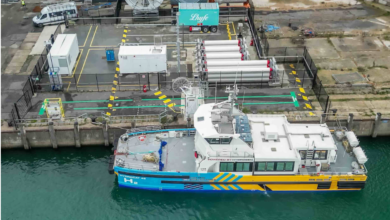SAS, Vattenfall, Shell and LanzaTech to produce SAF using hydrogen
The LanzaJet ‘Alcohol to Jet’ technology has been developed by LanzaTech and the US DoE’s Pacific Northwest National Laboratory (PNNL).

Vattenfall, SAS, Shell and LanzaTech will jointly explore the production of the world’s first synthetic sustainable aviation fuel (SAF) using the LanzaJetTM ‘Alcohol to Jet’ technology on a large scale in Sweden.
The synthetic SAF, also known as electrofuel, will be produced from fossil-free electricity and recycled CO2 from district heating, rather than using virgin fossil material in the production process. Electricity will mainly be used to make hydrogen via electrolysis.
Under the MoU, Vattenfall will investigate fossil-free electricity supply, hydrogen production and CO2 recovery. Shell will investigate fuel production, logistics and be the electrofuel buyer. LanzaTech will provide its gas fermentation expertise to make ethanol from the input gas streams, and parties will license the LanzaJet ‘Alcohol to Jet’ technology to convert the ethanol to electrofuel. SAS will participate as a potential buyer of the electrofuel.
The new production facility will produce about 50k tonnes/year of synthetic SAF, provided that an investment decision is made later. When fully operational, it could provide SAS with up to 25% of its global demand for sustainable aviation fuel in the 2030s.
A joint study has already shown promising conditions for the project, and all partner companies now agree to carry out in-depth analyses. The ambition is to commission the new production facility sometime between 2026 and 2027 near Forsmark on Sweden’s east coast.
Anko van der Werff, President and CEO, SAS, said, “Our joint commitment in finding ways to enable large-scale production of a more sustainable aviation fuel is a fantastic opportunity to accelerate the commercialization of SAF.”
Anna Borg, President and CEO, Vattenfall, added, “This initiative shows the potential of cross industry partnerships to drive the decarbonisation of a hard-to-abate sector.”
Anna Mascolo, President, Shell Aviation, commented, “Sustainable aviation fuel offers the greatest potential to reduce emissions from aviation.”
Jennifer Holmgren, CEO LanzaTech, noted, “We need to rethink carbon and together with fossil free power, harness it to create a new climate safe future for all.”
